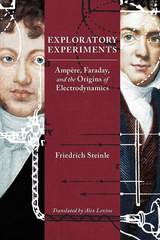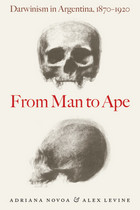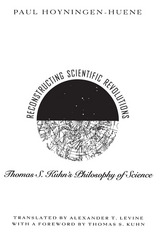
In this foundational study, Friedrich Steinle compares the influential work of Ampère and Faraday to reveal the prominent role of exploratory experimentation in the development of science. While this exploratory phase was responsible for decisive conceptual innovations, it has yet to be examined in such great detail. Focusing on Ampère’s and Faraday’s research practices, reconstructed from previously unknown archival materials, including laboratory notes, diaries, letters, and interactions with instrument makers, this book considers both the historic and epistemological basis of exploratory experimentation and its importance to scientific development.
Winner of the 2017 Ungar German Translations Award from the American Translators Association

Upon its publication, The Origin of Species was critically embraced in Europe and North America. But how did Darwin’s theories fare in other regions of the world? Adriana Novoa and Alex Levine offer here a history and interpretation of the reception of Darwinism in Argentina, illuminating the ways culture shapes scientific enterprise.
In order to explore how Argentina’s particular interests, ambitions, political anxieties, and prejudices shaped scientific research, From Man to Ape focuses on Darwin’s use of analogies. Both analogy and metaphor are culturally situated, and by studying scientific activity at Europe’s geographical and cultural periphery, Novoa and Levine show that familiar analogies assume unfamiliar and sometimes startling guises in Argentina. The transformation of these analogies in the Argentine context led science—as well as the interaction between science, popular culture, and public policy—in surprising directions. In diverging from European models, Argentine Darwinism reveals a great deal about both Darwinism and science in general.
Novel in its approach and its subject, From Man to Ape reveals a new way of understanding Latin American science and its impact on the scientific communities of Europe and North America.

Scholars from disciplines as diverse as political science and art history have offered widely differing interpretations of Kuhn's ideas, appropriating his notions of paradigm shifts and revolutions to fit their own theories, however imperfectly. Hoyningen-Huene does not merely offer another interpretation—he brings Kuhn's work into focus with rigorous philosophical analysis. Through extended discussions with Kuhn and an encyclopedic reading of his work, Hoyningen-Huene looks at the problems and justifications of his claims and determines how his theories might be expanded. Most significantly, he discovers that The Structure of Scientific Revolutions can be understood only with reference to the historiographic foundation of Kuhn's philosophy.
Discussing the concepts of paradigms, paradigm shifts, normal science, and scientific revolutions, Hoyningen-Huene traces their evolution to Kuhn's experience as a historian of contemporary science. From here, Hoyningen-Huene examines Kuhn's well-known thesis that scientists on opposite sides of a revolutionary divide "work in different worlds," explaining Kuhn's notion of a world-change during a scientific revolution. He even considers Kuhn's most controversial claims—his attack on the distinction between the contexts of discovery and justification and his notion of incommensurability—addressing both criticisms and defenses of these ideas.
Destined to become the authoritative philosophical study of Kuhn's work, Reconstructing Scientific Revolutions both enriches our understanding of Kuhn and provides powerful interpretive tools for bridging Continental and Anglo-American philosophical traditions.
READERS
Browse our collection.
PUBLISHERS
See BiblioVault's publisher services.
STUDENT SERVICES
Files for college accessibility offices.
UChicago Accessibility Resources
home | accessibility | search | about | contact us
BiblioVault ® 2001 - 2024
The University of Chicago Press









